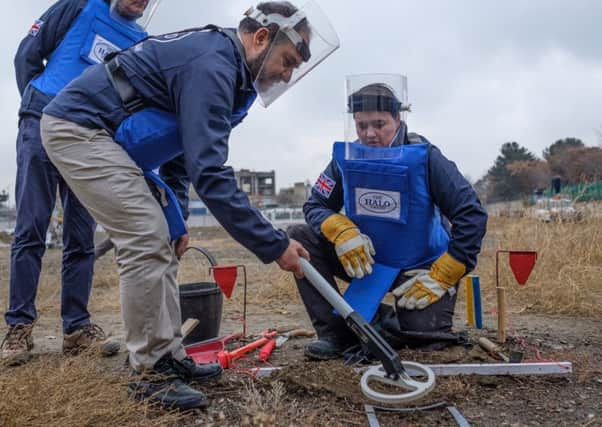Ruth Davidson: The Scots restoring our faith in charity


THE appalling revelations surrounding Oxfam over the last ten days appear almost tailor-made to erode what is left of trust in institutions and people in public life.
Politicians (expenses), the media (phone hacking), banks (the financial crash), the Church (abuse), and the arts (Weinstein) have all had their moment of ignominy over the last decade. Now, charitable institutions, so far viewed as above the fray, find themselves hauled to the gutter.
Advertisement
Hide AdAdvertisement
Hide AdAs I said in interviews at the weekend, there is a special circle of hell reserved for aid workers who use their position of power and trust to abuse the vulnerable people they are supposed to help. Oxfam’s hapless executives have hardly helped matters in the week since by failing to acknowledge the seriousness of the crisis. The case for defending the UK’s commitment to delivering 0.7 per cent of our national wealth to development is that much harder to make when some of the biggest recipients of taxpayers’ cash are caught covering up crimes.
The biggest danger is that scepticism about poverty relief and development work will harden into a deeper cynicism that none of it makes a difference.
This is something Scotland can help counter – and can do so largely through the example of some remarkable people around the country who, on a daily basis, are making an incredible difference all around the world. Last week, as the scandal surrounding Oxfam emerged, I was in Afghanistan as a guest of the Halo Trust. Based in Dumfriesshire, it is now the world’s largest humanitarian mine-clearance organisation. I was taken there by Halo’s CEO, Major General James Cowan. A vastly experienced soldier and former commander of the Black Watch, former head of counter-terrorism for the army and the man in overall charge of security for the London Olympics, James left military service two-and-a-half years ago to lead Halo and get it back on track after a parting of the ways between the charity’s board and its former chief.
He has taken it to new heights. Halo is now the largest NGO in Scotland, with more than 8,500 staff working in over a dozen countries, but it is also the biggest NGO from any country currently operating in Afghanistan.
While I was in the country with James, a number of Halo’s 3,500 workers handed over an enormous tranche of land in the West of the country to the local government. It has taken them 10 years to clear minefields and battlefields in Herat and now land that was dangerous and contained explosive material which could maim and kill civilians is now able to be farmed, built on or used for transportation.
Halo’s work in this one region will directly benefit 1.3 million people.
And James is far from alone. Three weeks ago, I had the great honour of meeting Bill Gates during a visit he made to the Roslin Institute at the University of Edinburgh. Along with his wife Melinda, he has set up a global foundation to promote development across the world. He was in Scotland to support the work at the Institute to develop more resilient livestock for agricultural use in developing countries. He could not have been more impressed by Scotland’s own commitment to supporting those less fortunate.
During the visit, he had a chance to meet some of Scotland’s leading social entrepreneurs: Magnus MacFarlane-Barrow, the founder of Mary’s Meals who, from a hut in Dalmelly, Argyll, now runs a global charity which feeds 1,230,000 children every day; Josh Littlejohn, whose network of Social Bite cafes around Scotland both employs homeless people and provides food and hot drinks for others across the country; and Sir Ian Wood, the remarkable Aberdonian businessman
Advertisement
Hide AdAdvertisement
Hide Adwho has signed Gates’ “Giving Pledge” – under which some of the world’s richest individuals agree to give away the majority of their accumulated wealth.
Last week, Sir Ian’s Foundation in Africa announced the creation of three new projects to help thousands of small farmers in Rwanda and Tanzania supply tea factories. Interviewed about his work last week, Sir Ian remarked: “I fundamentally believe if we are lucky enough to have time on this earth then we should do something positive with it.”
And these are not Scotland’s only examples. Another signatory to Gates’ pledge is Sir Tom Hunter, the Sports Direct founder, whose Hunter Foundation now funds and supports educational and poverty-reduction projects from Scotland to Africa. Ann Gloag, the founder of Stagecoach – and another who has signed the Giving Pledge – was unable to meet Gates when he was in Scotland because she was visiting Africa where the hospital ships she supports do immense, life-saving work. Or, close to home, there is Clyde Blowers CEO Jim McColl who was recently at the Scottish Parliament to talk up the work his school is doing, investing in young people on the verge of dropping out of mainstream education so they get the skills they need to get on in life. Inspirations all.
They are, of course, only the most high-profile figures at work in Scotland today. There are many, many more who either donate or work towards relieving poverty at home and around the world. You do not have to be a proponent of Scottish
exceptionalism to agree that they all sit within a national tradition combining entrepreneurialism with a social conscience, dating back to Andrew Carnegie and beyond. Or ‘putting something back in’ as Sir Ian Wood might explain it. Scotland’s own example is one that should quieten the cynics this week. We are making a difference, every day.
Ruth Davidson is leader of the Scottish Conservatives and MSP for Edinburgh Central
